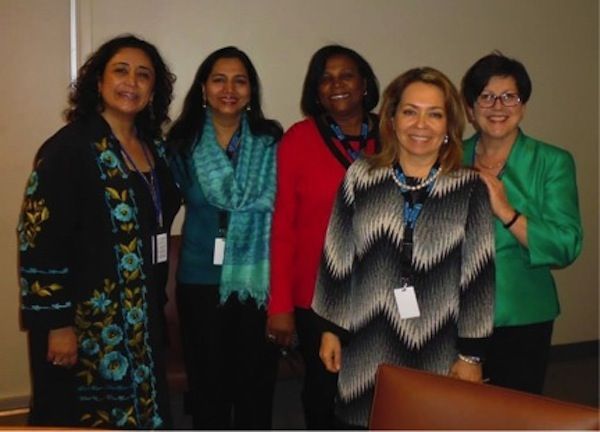
By Simel Esim and Hanan El-Youssef
On what seemed to be the first days of spring in New York, the 59th Session of the Commission on the Status of Women (CSW or Beijing +20) was marked with the bustle of voices from around the world discussing gender equality and women’s empowerment. This 59th gathering of the CSW marks the 20-year anniversary of the adoption of the Beijing Declaration and Platform for Action of 1995.
Close to 9,000 participants from around the world came together to discuss progress toward the twelve critical areas delineated in the Beijing Declaration of 1995. The statements and discussions iterated during the conference underlined progress in areas such as education and maternal mortality over the last two decades, but there was general agreement that the blueprint still remains only partially fulfilled. For true progress to be achieved there needs to be stronger leadership commitment to stepping up action for equality. Women still face limited bargaining and decision-making power, often work in undervalued and low-paid jobs, take the responsibility for most unpaid care work, face gender pay gaps, not to mention gender-based violence.
Indeed, some in the women’s movement expressed disappointment at this year’s CSW Declaration. As captured in an article in the Guardian, “the Women’s Rights Caucus, which monitors discussions at the CSW, said it was concerned that the language in the declaration was being watered down.”
Nevertheless, some progress has been made. The UN Post-2015 Development Agenda and its Sustainable Development Goals renews global commitment to achieving gender equality. And – positioned astride civil society and the private sector – co-operatives emerge as a significant player.
Co-operative enterprises stand in solidarity with raising the bar and pushing for even more ambitious measures of equity for women in the work force, in the marketplace, in leadership, and in overall economic autonomy and self-determination. Of particular interest during the first days of the CSW – a side event on the role co-operative enterprises play in achieving gender equality and empowering women.
Co-organised by the International Co-operative Alliance and the International Labour Organisation, this event gathered 30 participants from the co-operative, women’s, and trade union movements, as well as delegates of UN agencies, UN Member States (Mongolia), and representatives of civil society organisations.
This event was inspired by Dame Pauline Green, the first woman president of the International Co-operative Alliance (which celebrates its 120th anniversary this year). In addition to the legacy of positive and concrete institutional change that Dame Pauline is building in her presidency at the Alliance, she is determined to build a legacy of positive social change, where co-operatives meet their full potential in empowering women.
The event was built upon the preliminary results of a study co-commissioned by the International Labour Organisation and the International Co-operative Alliance, which examines the role co-operatives play in empowering women and achieving gender equality. The study captures the perceptions of survey respondents and qualitative, in-depth interviews with leaders from co-operative businesses, civil society organisations, and labour and trade unionists from all over the world.
Dr. Lisa Schincariol, lead researcher of the study, shared preliminary findings – which constitute the first global and cross-sectoral exercise in examining the role co-operatives play in closing the gender gap. 80% of respondents favour the co-operative model over other forms of organisation as a vehicle for securing gender equity. And over 75% of survey respondents felt that co-operatives have improved the quantity and quality of participation of women in the last 20 years. Survey results indicate an increasing instance of women-owned and women’s ownership of co-operatives, especially in financial and social co-operatives in Europe and North America. Progress in number and quality of women’s participation in and ownership of co-operatives is particularly noteworthy in the agricultural, consumer, and handloom sectors in the so-called global south.
Improvement and progress is marked. And yet, the co-operative sector boasts a historical legacy of empowering women that traces back to its roots. Dame Pauline – with her usual inspiring energy – reminded of Eliza Brierley, the first woman member of the Rochdale Pioneers. Eliza joined as a member just two years after its founding in 1844. She enjoyed the same, equal, and full rights as her fellow (male) members in a time and context in which women were otherwise excluded from equal economic participation in society. Dame Pauline reminded of the legacy of co-operatives around the world and across sectors pioneering the inclusion of women as members, owners, and leaders of co-operative enterprises.
Nevertheless, Dr. Schincariol’s analysis does not shy away from the challenges facing further women’s empowerment. And her acute analysis does well in pointing out areas for improvement. While respondents feel strongly that co-operatives fare better than their counterparts in the marketplace in providing opportunities to women for leadership, co-operative enterprises on the whole do not meet their full potential in fully representing diversity and equity for women in leadership positions. Dr. Schincariol proposes that the Co-operative Values and Principles – such as self-determination, open and voluntary membership without discrimination, and democratic governance – set an ideal and standard so high that expectations are less easily met. The co-operative benchmark is such that anything short of holistic equity seems to fall short, despite the fact that co-operatives outperform other enterprise models in placing women in leadership positions – particularly in the co-operative mutuals. A study conducted by the International Co-operative and Mutual Insurance Federation (ICMIF) delves further into the achievements of women entrepreneurs in the insurance sector.
The Alliance / ILO study also clearly identifies some barriers for the further achievement of gender equity and women’s empowerment even for co-operative enterprises. Unsurprisingly, perhaps, legal frameworks can make or break the access to and instance of women in business ownership, enterprise leadership, and economic autonomy. Regulations concerning land ownership, property titles, and inheritance laws can often greatly curtail the ability and access of women to economic autonomy.
Vanessa Bransburg, Director for Co-operative Development at the Center for Family Life in Brooklyn, New York, shared her experience facilitating the grassroots development of no less than eight immigrant-women’s co-operatives in Brooklyn – a very diverse and disadvantaged community where 20% of the population lives below the poverty line.
Valeria Esquivel of UNRISD mentioned that the repeated association of flexibility in the work place with women is a male-as-breadwinner bias and falls short of a more meaningful argument for real and substantive change – such lexicon does not do enough to break down patterns of systemic discrimination and may even reinforce them. Sarah Gammage of UN WOMEN reiterated Esquivel’s comments calling for an emphasis on autonomy, agency, and empowerment.
A dynamic discussion ensued with participants from various regions and sectors. Dame Pauline emphasised the reciprocity of positive impact: women power co-operatives; co-operatives empower women. And where positive cycles of change can happen, impact ensues in the broader community and context. Bransburg pointed to community-wide, psychological benefits of the co-operatives in Brooklyn: instances of self-confidence are higher, depression lower.
Ernestina Ochoa Lujan – a Peruvian domestic worker organizer and Vice President of the International Domestic Workers Federation (IDWF) – expressed the need for the dissemination of the domestic worker co-operative model as a lighthouse model that can be reproduced around the world. Simel Esim, Chief of the ILO’s Coop Unit and moderator for the session, emphasized the importance of building alliances between women’s, co-operative, and trade union movements.
Male-dominated management and leadership structures may still be the norm in some contexts – even in some co-operative communities -- but it is time for these networks to pay heed to the strength of diversity and equity. These overly homogeneous structures ought to check themselves according to the Co-operative Values and Principles, and make sure they do not disenfranchise themselves of determining and participating in the future of the global co-operative economy. Co-operatives like Si Se Puede may appear small and emerging in size and age, but they are ineluctably sound in their co-operation. This power can be further harnessed by a rigorous implementation of the 6th Co-operative Principle: Co-operation among Co-operatives.
This study, and its launch at the side event at the CSW in New York on 10 March 2015, marks just the beginnings of a reinvigorated co-operative commitment to achieving gender equity and women’s empowerment. The study identifies areas for further research, reaffirms the ethical standards co-operatives hold themselves to, and points to areas where further progress must be made. It offers the global co-operative community a challenge to reaffirm its commitments to self-determination, equity, and social justice. We are committed to seeing this exciting initiative through and look forward to engaging further with fellow activists, co-operators, feminists, workers, and global citizens in championing the power women bring to co-operatives and in challenging co-operatives to continue empowering women.
The complete survey findings are available in the report "Advancing gender equality: The co-operative way".
For more information on co-operatives and women’s empowerment, check out some of these resources and links:
- ICMIF study on women in leadership in the co-operative insurance sector
- Leveraging the cooperative advantage for women’s empowerment and gender equality
- Resource guide for advanced training of co-operatives on entrepreneurship development of women and gender equality
Participants in attendance represent a diverse array of institutions and regions including – among others from Jamaica, Nepal, Trinidad and Tobago, and beyond:
- Committee for the Promotion and Advancement of Co-operatives (COPAC)
- Grassroots Organizations Operating Together in Sisterhood International (GROOTS) (GROOTS Trinidad & Tobago (Groots T & T) and Sistren Theatre Collective (Jamaica) of Groots International)
- International Co-operative Alliance
- International Domestic Workers Federation (IDWF)
- International Labour Organisation (ILO)
- Jamaica Household Workers Association (JHWA)
- National Co-operative Federation of Nepal
- United Nations Department of Economic and Social Affairs (UNDESA)
- United Nations Research Institute for Social Development (UNRISD)
- UN Women
- Self Employed Women’s Association (SEWA)
- We Effect Swedish Co-operative Centre
- Women in Informal Employment: Globalizing and Organizing (WIEGO)
- Women’s International Cross-Cultural Exchange (ISIS-WICCE)
Picture: From left: Simel Esim, Savitri Singh, Xiomara Nuñez, María Eugenia Pérez Zea, Dame Pauline Green at the joint International Co-operative Alliance and International Labour Organisation side event to the 59th Session of the Commission on the Status Women (10 March 2015, New York).





